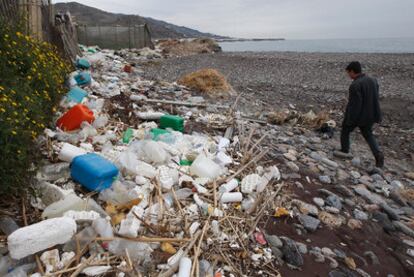Getting fishermen hooked on plastic
A European Commission initiative offers financial incentives to shipping fleets to go in search of the millions of containers littering the continent's seas
The world's oceans and seas provide fewer and fewer fish each year, which in turn reduces the employment capacity of the fishing sector. At the same time, the inexorable growth in human population has deposited a vast swathe of plastic waste on the surface of the seas, causing innumerable environmental concerns.
It is a double conundrum for which the European Union fisheries commissioner, Maria Damanaki, believes a solution is evident: fishing for plastic. "It has many benefits," she says. "There will be results in terms of decontamination and fishermen will be able to work during periods when they are unable to fish."
The European plastic recycling organization has applauded the initiative, and the fishing sector and industrial groups are to launch a pilot project at the end of the month to net plastic in the waters around the Côte d'Azur.
The Mediterranean, cradle of western civilization and a sea that hugs three continents, is slowly but surely turning into a garbage dump. Last summer, a Franco-Belgian study estimated that 250 billion plastic objects are hidden beneath the Mediterranean Sea and that around 500 metric tons of waste has been dissolved among its waves. It is a path to disaster, given the length of time needed for the waters to replenish.
"Things cannot go on like this," Damanaki told an international conference on contamination in the Mediterranean a month ago. Tackling the problem at its source- education, sanctions and the reduction of plastic in everyday use- may not be enough in Brussels' estimation. The scheme to fish for plastic waste is not legislative and will not be imposed upon governments. It is a suggestion, and the European Fishing Fund will have the final word. Spain is entitled to ¤1.131 million from the fund for the period 2007-2013.
The fishing authorities believe the initiative is a positive one that "will allow the diversification of the sector, give fishermen added income and provide an indisputable environmental benefit."
France, Denmark and Germany are pioneering the idea. Last year, with the help of the fund, France paid its fleet 375 euros per ton of plastic; 1,000 tons were hauled from the sea.
In Spain, however, the fleets are yet to be convinced of the need to swap fish for plastic. "It is necessary first to know which fleet will be affected, which type of sector and which country. Without this information, it is difficult to comment," says the president of the Cádiz-based Fishing Development Group, Nicolás Fernández.
Damanaki has been credited with several "curious" initiatives by the sector but none receive kind eulogies among those that fish the southern Spanish waters.
Galician fisherman, though, are accustomed to talking about recycling. In 2000, lacking a fishing agreement with Morocco, funds were made available for economic diversification, but none of the alternatives to traditional fishing were consolidated.
In Valencia, the scheme has been received with cautious approval. "Taking into account the amount of money paid it could be a good thing, but always without relinquishing biological unemployment benefits," says José Ramón Domingo, president of the Guild of Fishermen in Valencia.

Tu suscripción se está usando en otro dispositivo
¿Quieres añadir otro usuario a tu suscripción?
Si continúas leyendo en este dispositivo, no se podrá leer en el otro.
FlechaTu suscripción se está usando en otro dispositivo y solo puedes acceder a EL PAÍS desde un dispositivo a la vez.
Si quieres compartir tu cuenta, cambia tu suscripción a la modalidad Premium, así podrás añadir otro usuario. Cada uno accederá con su propia cuenta de email, lo que os permitirá personalizar vuestra experiencia en EL PAÍS.
¿Tienes una suscripción de empresa? Accede aquí para contratar más cuentas.
En el caso de no saber quién está usando tu cuenta, te recomendamos cambiar tu contraseña aquí.
Si decides continuar compartiendo tu cuenta, este mensaje se mostrará en tu dispositivo y en el de la otra persona que está usando tu cuenta de forma indefinida, afectando a tu experiencia de lectura. Puedes consultar aquí los términos y condiciones de la suscripción digital.








































